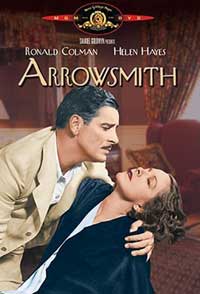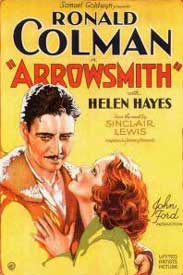 To me the most interesting moments in Arrowsmith (1931) were with Clarence Brooks who plays a black doctor in the West Indies. For once Brooks would be playing a character other than porter, butler, or loinclothed tribesman, though even counting Arrowsmith, his best roles were in a couple black-cast cowboy films, including The Bronze Buckeroo (1939).
To me the most interesting moments in Arrowsmith (1931) were with Clarence Brooks who plays a black doctor in the West Indies. For once Brooks would be playing a character other than porter, butler, or loinclothed tribesman, though even counting Arrowsmith, his best roles were in a couple black-cast cowboy films, including The Bronze Buckeroo (1939).
It's just such a breath of fresh air to see him play something reasonable like a doctor. Which is not to say the role is inherently exciting or written well, but in 1931 the idea of a black doctor & a white doctor working side-by-side as equals was unheard of in Hollywood films, & yet here it is occurring as a matter of course, as if it were the most natural thing.
Why such roles couldn't be seen all the time in those days if John Ford could do it in one of his minor films, who is to say. It's not that John Ford had a clearer insight into American racism, for the rest of the film has its few moments for black actors entirely stereotypical.
Ronald Coleman plays Martin Arrowsmith, studying to be a doctor, with high goals, certain he will someday find a cure for cancer.
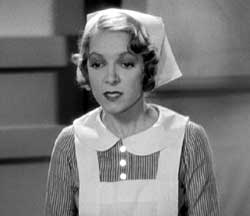 But in the first minute in his first hospital assignment, he gets a crush on a nurse (Helen Hayes) & asks her out. Thinking with his pecker, the plans for his life completely change. But in the first minute in his first hospital assignment, he gets a crush on a nurse (Helen Hayes) & asks her out. Thinking with his pecker, the plans for his life completely change.
He gives up his dreams of laboratory research, because marriage means supporting a family. His young wife is from South Dakota & he ends up in a small practice in family medicine in her hometown.
John Ford begins to forge a Romance of a country doctor, getting us entirely to sympathize with Dr. Arrowsmith. Soon Arrowsmith feels his genius is stagnating & he must do research. He sets up his own small lab.
He may be stuck in nowhere, but he figures resarch doesn't need a city. An outbreak of blackleg in the local cattle gets him investigating the disease, with the result that he discovers the first effective treatment.
Soonafter he & his wife abandon small town life for New York city where Arrowsmith was offered a lab in a state of the art research facility in a modern art deco environment.
After two years failing to make any discoveries, he finally sees before him a breakthrough. Alas for him, before he finishes his project, Louis Pasteur publishes his own findings in France, & Arrowsmith's research just missed being timely.
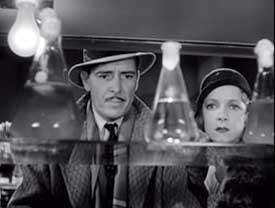 After an outbreak of bubonic plague due to rats on New York Harbor's docks, Arrowsmith begins his work with rats & fleas, heading ultimately for the West Indies with instructions from his mentor to experiment on human subjects even if it seems cruel, as the outcome will justify the method. After an outbreak of bubonic plague due to rats on New York Harbor's docks, Arrowsmith begins his work with rats & fleas, heading ultimately for the West Indies with instructions from his mentor to experiment on human subjects even if it seems cruel, as the outcome will justify the method.
And here's where the tone of the film changes, as Arrowsmith's frustrated desire to make important discoveries begins to blind him to simple humanity.
He's not just experimenting on people but on black people. Ford doesn't exaggerate the change in Dr. Arrowsmith's character, & it becomes more disturbing because we've spent the whole film liking the guy (more or less), & the film doesn't make it instantly obvious that author or director is perfectly aware that here is an incident of complete failure of humanity in a physician.
He works side-by-side with a Howard University educated black doctor, but apart from this one character, it is a world where gospel-singin' black folk are dying of the plague. Between the Arrowsmiths' maid, the gospel harmonizers, & the voodoo worshippers, there's not a lot can be said for the construction of these stick-figure stereotypes.
But it serves the development of Dr. Arrowsmith's character, in that he comes to see these folk not as humans but as guinea pigs. Obvioiusly to Arrowsmith viewed them as stereotypical objects.
His wife Lee falls ill in a predictable plot development. That the film has never indicated that she has any life of her own makes her hardly more than a cypher & a puppet for the plot, so we don't feel the tragedy of her demise & only Martin Arrowsmith's grief matters, & his sense of his own fault in Lee's death.
His grief shakes him back to humanity. He throws his cruel experiments out the door, gets drunk, & when sobered begins at last to treat people for their illnesses rather than to experiment on them.
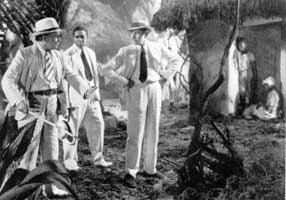 Based as it is on the 1925 Pulitzer Prize novel by Sinclair Lewis, Lewis always has a political or "peoples' advocacy" point to his fiction, & his declined Pulitzer & his Nobel Prize notwithstandng, he was not a good writer of fiction but only of politics.
Based as it is on the 1925 Pulitzer Prize novel by Sinclair Lewis, Lewis always has a political or "peoples' advocacy" point to his fiction, & his declined Pulitzer & his Nobel Prize notwithstandng, he was not a good writer of fiction but only of politics.
John Ford has attempted to find the story, & Coleman has attempted to play the character, but it does remain rather more politics than fiction.
The film like the novel becomes an indictment of scientific process. When Arrowsmith decides to pretend to treat half his patients, & to actually treat only the other half for comparison, this is how it is really done even today. Treatments can only be assessed by comparison to a control group of the untreated.
Quite some while back I worked as an editor of medical papers in a research hospital at the University of Washington, & can attest to the diminished humanity of research physicians. They harden themselves first to the torture of animals for the sake of science & then very easily transfer to people what they learned about lack of compassion & ease of torture.
They lose no sleep over doubleblind studies conducted on the desparately ill, embracing the falsehood that uninsured uneducated white trash who had no other option for treatment understood full well that the odds were fifty-fifty the doctor was only pretending to be giving valuable care while watching their disease progress untreated.
It's an interesting nazistic dilemma built into the system, & it's surprising that it is so rarely the subject of art, film, literature, or even just plain activism. And while Arrowsmith is not a completely successful film, it is certainly thought provoking.
copyright © by Paghat the Ratgirl
|
